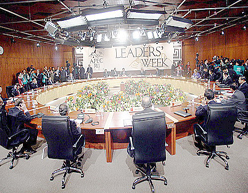APEC leaders agree to combine efforts against global crisis

The Asian Pacific Economic Cooperation (APEC) member states concluded a weeklong summit in the Peruvian capital of Lima that culminated with the declaration of the APEC heads of state on November 22 to fight the global crisis, both individually and collectively, so as to restore confidence in their financial systems and ensure long-term growth in their economies.
Indeed, as expected, the central themes of the Lima summit were the current global financial crisis, its devastating impacts and the search for the measures to solve these negative issues in the shortest period of time. For instance, in his speech, Russian President Dmitry Medvedev talked about the measures adopted by his government to combat the crisis at home and also shared his vision on how to best resolve the current economic crisis at the global level. Similarly, other APEC leaders also noted the measures being taken by the respective governments to fight the global malaise in their national economies and also offered ways out of the global financial mess.
The final resolutions adopted by the APEC leaders were set out in the final declaration, in which the summiteers also reaffirmed their support for and commitment to the G20’s decisions taken at the Washington summit on the global economy earlier in the month. “We welcome the G20’s Washington Declaration and strongly support the common principles that will guide the Action Plan for financial markets reform,” the summiteers said in the Lima communique. “In this regard, we strongly support the broad policy response needed to restore global economic growth and stability through: closer macroeconomic cooperation and avoiding negative spillovers.
The APEC leaders also reaffirmed their support for emerging and developing economies and called for comprehensively reforming and strengthening the international financial institutions (IFIs) to reflect the increasing voice and representation of the emerging and developing economies that will make them be more responsive to future global challenges. “We reiterate our firm belief that free market principles and open trade and investment regimes will continue to drive global growth, employment and poverty reduction.”
The leaders also stressed their recognition of the fact that the IMF, the World Bank, the Asian Development Bank, the Inter-American Development Bank and other multilateral development banks have a critical role in assisting economies affected by the financial crisis. “Particularly, the IMF, with its focus on surveillance, should strengthen collaboration with other IFIs by enhancing efforts to integrate regulatory and supervisory responses into the macro-prudential policy framework and conduct early warning exercises.”
On a more optimistic note, the APEC nations leaders said that they were convinced that they could overcome this crisis within 18 months. “We have already taken urgent and extraordinary steps to stabilize our financial sectors and strengthen economic growth and promote investment and consumption.”












 Web design,
Web design,